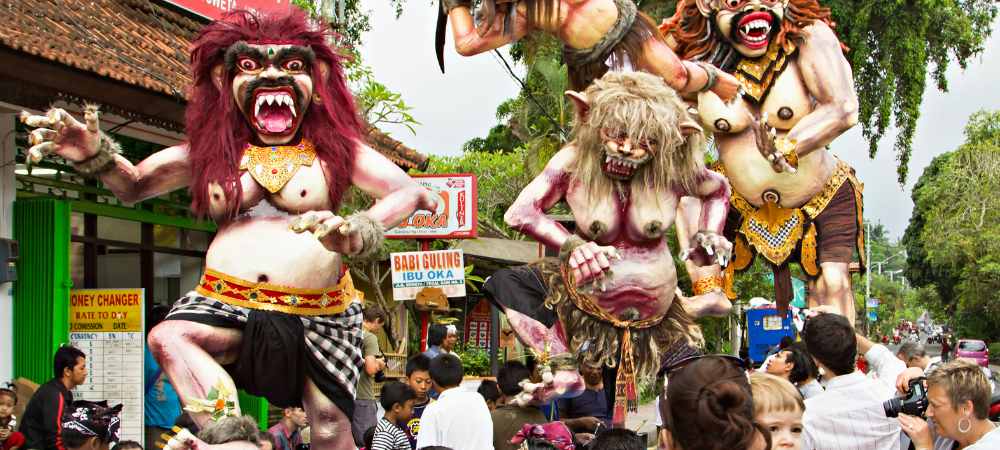Silent Day: The Balinese New Year – A Unique Cultural Experience
Bali, the Island of the Gods, is renowned for its verdant landscapes, vibrant culture, and the warm hospitality that beckons travelers from around the globe. Amidst this land of ceaseless charm lies a tradition so profound that it halts the usual rhythmic pulse of life, giving way to a day of profound silence and reflection – Nyepi, the Balinese New Year. Unlike any other New Year celebration you’ve ever witnessed, Nyepi ushers in a day of stillness that envelops the entire island in a peaceful embrace.
As a curious traveller or a seasoned wanderlust-filled tourist, the contrast of Silent Day to Bali’s ordinarily lively atmosphere presents a rare and enchanting experience. It’s a day where the streets lay empty, the skies clear of flights, and the noise of daily hustle is replaced by a hush that allows nature’s own symphony to prevail.
What Is Nyepi
Nyepi, known colloquially as “Silent Day,” is not only a new year celebration but a day for self-renewal, reserved for meditation, fasting, and silence. This is a day when the entire island of Bali comes to a standstill, adhering to a set of local customs known as the Catur Brata Penyepian. These four main prohibitions are central to the observance of Nyepi and include:
- No fire or light (Amati Geni): This includes the use of electricity, hence the island turns off its lights, creating an unparalleled opportunity to witness the star-studded sky, free from light pollution.
- No work (Amati Karya): All forms of physical labor and routine are set aside, inviting a pause in daily chores and business transactions.
- No travel (Amati Lelungan): Everyone stays indoors, creating a rare sight of deserted streets across an otherwise bustling island.
- No entertainment (Amati Lelanguan): This means no music, television, or revelry to distract from personal reflection and family bonding.
These practices stem from the Hindu belief in balancing the relationship between humans, nature, and the spiritual realm. By adhering to these restrictions, the Balinese believe they can appease and drive away evil spirits from the island, ensuring a year of prosperity and good fortune. The silence and lack of activity are also meant to deceive these malevolent forces into thinking Bali is uninhabited, prompting them to pass over the island.
The spiritual significance of Nyepi is profound. It’s a day reserved for introspection, self-reflection, and meditation, allowing one to contemplate on the past year and mentally prepare for the coming year. The Balinese use this time to cleanse the soul and start anew, with a purified mind, body, and environment.
Historically, Nyepi has been observed for centuries, evolving from its animistic roots into a predominantly Hindu ceremony. Over time, the island has seen changes in how this day is celebrated, but the essence of peace, silence, and self-renewal remains steadfast. Today, it has become an intrinsic part of Bali’s cultural identity, one that is observed with reverence and strict discipline.
For tourists, Nyepi offers a moment to unplug from the modern world and partake in this unique form of spiritual observance. It’s an opportunity to witness a side of Bali that contrasts dramatically from the usual imagery of lively beaches and all-night parties. By understanding the meaning and customs of Nyepi, visitors gain a deeper appreciation of Balinese culture and the island’s devotion to tradition and spiritual belief.
Pre-Nyepi Celebrations
The approach to Silent Day is anything but quiet. In the days leading up to Nyepi, Bali is abuzz with anticipation and a flurry of vibrant activities that set the stage for the coming quietude. Understanding and participating in these pre-Nyepi rituals can offer tourists an enriched experience and the context needed to fully appreciate the silence that follows.
Melasti or Mekiis Rituals
The Melasti or Mekiis processions take place a few days before Nyepi. During these ceremonies, Balinese Hindus cleanse and purify sacred objects from the temples in the sea. It’s an elaborate ritual where villagers dress in their finest clothes and carry the revered effigies of the gods to the nearest body of water, symbolizing the cleansing of the entire world.
For tourists, witnessing Melasti is a chance to see the communal spirit of Bali in action. The processions to the beaches, the sound of gamelan music, and the prayers at sunset are a testament to the island’s enduring connection to tradition and the natural world.
Ogoh-Ogoh Parades
On the eve of Nyepi, the Balinese streets come alive with the Ogoh-Ogoh parade. Ogoh-Ogoh are giant papier-mâché effigies that represent the evil spirits. These effigies are meticulously crafted by local communities in the months leading up to Nyepi and are both fearsome and awe-inspiring in their detail and size.
The parades are a dramatic and loud spectacle, where the Ogoh-Ogoh are hoisted on bamboo frames and carried through the streets by the Balinese youth, accompanied by cacophonous music and enthusiastic crowds. The purpose of this parade is to rouse the evil spirits and then trick them into leaving the island. The night ends with the burning of the Ogoh-Ogoh, a symbolic gesture to purify the environment from spiritual pollutants.
For visitors, the Ogoh-Ogoh parade is a must-see event. It is not only a display of artistic expression but also a shared cultural moment that is both entertaining and deeply meaningful. Tourists are welcomed to join the festivities, photograph the events, and even participate in the communal efforts. However, it’s essential to show respect by dressing modestly, following local cues, and not disrupting the ceremonies.
These pre-Nyepi rituals provide a stark contrast to the silent day that follows, allowing tourists to experience the full spectrum of Balinese culture. Engaging with these events offers a deeper connection to the island and its people, paving the way for a contemplative and respectful Nyepi observance.
The Silent Day Experience
As dawn breaks on Nyepi, the island of Bali ushers in an extraordinary transition from the vivacious energy of the Ogoh-Ogoh parades to an unprecedented quietude. For tourists accustomed to the island’s typical liveliness, Nyepi presents a remarkable 24 hours of inactivity that can be a powerful and introspective experience.
A Day Like No Other
Nyepi is observed from 6 a.m. on one day to 6 a.m. the next. During this time, the island is shrouded in a powerful silence. The bustling streets become empty, the hum of engines is absent, and even the usually busy beaches remain untouched by human footsteps. The airport closes down, and all forms of transportation come to a halt, as do most modern amenities including, for many, electricity. As a tourist, you will witness the rare sight of a modern society voluntarily stepping back into a quieter time.
Embracing the Quiet
For visitors staying in Bali during Nyepi, there is a unique opportunity to engage in a day of self-reflection and embrace the quiet. You can take this time to practice yoga, meditate, read, or simply rest. Without the distractions of television, internet, and social media, many find that Nyepi offers a rare chance to reconnect with themselves or to spend undisturbed quality time with loved ones.
Stargazing
One of the most magical aspects of Nyepi’s enforced darkness is the clarity of the night sky. With minimal light pollution, the stars appear brighter and more numerous, making it an ideal time for stargazing. From the privacy of your villa’s garden or poolside, you can observe constellations and shooting stars, an activity that is as educational as it is enchanting for both adults and children.
The Rules and You
As a visitor, it’s imperative to respect the local customs during Nyepi. This means staying within your hotel or villa grounds, keeping noise to a minimum, and not using bright lights that might disturb the solemnity of the day. The local community takes the observance of Nyepi very seriously, and the Pecalang, traditional security men, patrol the streets to ensure compliance. This is not a day for outdoor activities, tours, or beach outings; instead, it’s a time for quietude and respect for the culture’s practices.
Experiencing Silent Day in Bali can be one of the most memorable aspects of your visit, providing insight into a different pace of life and a different set of values. It’s a profound cultural immersion that allows you to observe a community-wide commitment to tradition, silence, and spiritual cleansing. As the island emerges from the quiet, you might find that you have gained a new perspective on the importance of stillness and the rejuvenating power it can hold.
Practical Tips for Tourists
As you prepare to participate in this unique day of silence and reflection, there are practical considerations to keep in mind. Being informed and prepared will help ensure that your Nyepi experience is respectful, serene, and enriching.
Choosing the Right Accommodation
Booking a private villa during Nyepi can greatly enhance the experience. Villas offer privacy, space, and often a more controlled environment where observing the day’s restrictions can come with a degree of comfort and personal freedom. Ensure your villa has adequate supplies and confirm with the management about the services they can provide during Nyepi, such as in-house dining.
Preparing for Nyepi
Since all shops, restaurants, and public services are closed during Nyepi, it’s important to stock up on essential items beforehand. Here are some things to consider:
- Purchase enough food and water to last at least two days, as establishments will also be closed the evening before Nyepi.
- Plan for meals that don’t require cooking, or if your villa includes a kitchen, prepare ingredients for simple, easy-to-make dishes.
- Make sure you have essential medications and first-aid supplies.
- Consider the need for cash, as ATMs and banks will not be in service.
Respecting the Observance of Silence
The Balinese take the observance of Nyepi very seriously, and as a visitor, respecting these practices is crucial. Here’s how you can do that:
Stay indoors and within the boundaries of your villa. Do not attempt to travel around the island.
Keep noise to a minimum — this includes music, television, and loud conversations.
Draw curtains in the evening to block any light from spilling outside.
Plan silent or quiet activities. Reading, writing, meditating, and yoga are excellent ways to spend the day.
Activities Within the Villa
While the restrictions of Nyepi might seem daunting at first, they can actually provide a refreshing break from the digital world and an opportunity to engage in other activities:
Bring books, board games, art supplies, or a journal to document your experience.
Use the time to plan the rest of your trip, reflect on your travels, or set goals for the future.
Enjoy the amenities your villa offers, like a private pool or garden area, for relaxation and contemplation.
After Nyepi
The day after Nyepi is known as Ngembak Geni, which marks a return to daily life but also includes a time for forgiveness and family gatherings. As services resume, it’s an opportunity for you to step back into the vibrant life of Bali, perhaps with a renewed appreciation for the island’s culture and your own inner peace.
Emergency Information
Make a note of emergency contact numbers for your embassy, local emergency services, and the villa’s management in case of any issues. Despite the shutdown, there is always a system in place to address emergencies.
By preparing appropriately for Nyepi and embracing its underlying principles, tourists can not only show respect for Balinese culture but also engage in a day of reflection that could be a highlight of their travel experience. It’s an invitation to slow down, introspect, and connect with the quieter side of life – a rare gift in our fast-paced world.
- Welcome Back To My Villas in Bali - November 17, 2021





